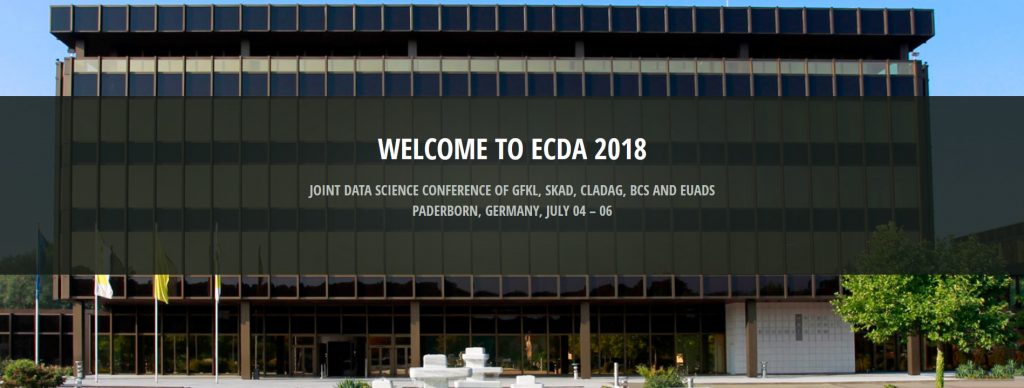Following previous editions in Luxembourg (2013), Bremen (2014), Colchester (2015), and Wroclaw (2017), the European Conference on Data Analysis (ECDA) will take place in Paderborn, Germany, 4th – 6th July, 2018. It will be located in the Heinz Nixdorf MuseumsForum, the world’s largest computer museum.
ECDA was launched in 2013 and emerged from the annual conference of the German Classification Society (GfKl). It is supported by the European Association for Data Science (EuADS), the International Association for Statistical Computing (IASC), the German Computer Science Society (GI), as well as other European classification societies (British Classification Society (BCS), Section on Classification and Data Analysis of the Polish Statistical Association (SKAD), Classification and Data Analysis Group of the Italian Statistical Society (CLADAC), Japanese Classification Society (JCS)). ECDA 2018 includes the 42nd Annual Meeting of the GFKl Data Science Society and the Symposium on Data Science Education of the European Association for Data Science (EuADS).
ECDA 2018 will be hosted by Paderborn University, a modern profile university that has developed into an internationally respected center for top-level research and higher education in the recent decades. The ambition of UPB is to play a leading role as “the university for the information society”. With a strong foundation in computer science and its applications, it contributes to the scientific and technical development of the information society, while critically reflecting these developments taking into account our society’s history, norms, and values. Obviously, these goals can only be achieved by utilizing the entire spectrum from the “hard” sciences to the arts and humanities, which all need to complement and learn from each other.
With this motto in mind, ECDA 2018 will pay special emphasis on interdisciplinary research and the interaction of theory and practice. The scientific programme of the conference will include sessions with invited talks and contributed presentations covering a broad range of topics. These include but are not limited to:
Theory and Methods
Big Data; Clustering, Classification, Discrimination and Regression; Data Science; Databases and Data Management; Data Mining, Text and Web Mining; Data Visualization; Dimension Reduction; Image Analysis and Computer Vision; Impact of Technical Revolution and Library Science; Knowledge Representation and Discovery; Machine Learning; Mathematical Foundations of Data Science; Multivariate Methods; Online Algorithms and Algorithms for Data Streams; Social Network Analysis; Statistical and Econometric Methods; Symbolic Data Analysis.
Applications
Archeology; Biostatistics; Business and Management; Economics; Education; Engineering; Finance; Geosciences; Industrial Automation; Linguistics; Marketing; Medicine and Health Care; Musicology; Psychology; Risk Management; Social Sciences.
Besides, ECDA will feature several special sessions on interesting research themes within the scope of the conference. The (still growing) list of these sessions includes the following:
- Advances in Recursive Partitioning and Related Methods (Claudio Conversano)
- Algorithm Selection/Configuration and Machine Learning (Bernd Bischl, Felix Mohr, Marcel Wever)
- Applications in Digital Humanities (Michaela Geierhos)
- Big Data and Complex Network Analytics (Martin Atzmüller)
- Bioinformatics and Biostatistics (Dominik Heider)
- Comparison and Benchmarking of Cluster Analysis Methods (Christian Hennig)
- Computational Social Science (Henning Wachsmuth)
- Consumer Preferences and Marketing Analytics (Friederike Paetz, Daniel Guhl)
- Data Analysis Models in Economics and Business (Jozef Pociecha)
- Data Analysis in Finance (Krzysztof Jajuga)
- Data Science for Mental Health (Fionn Murtagh, Mohsen Farid)
- Dimension Reduction and Visualisation for Classification (Niel le Roux)
- European Association for Data Science (EuADS) Symposium on Data Science Education (Rolf Biehler, Reinhold Decker, Peter Flach, Berthold Lausen, Carsten Schulte)
- Interpretable Machine Learning (Eneldo Loza Mencia, Johannes Fürnkranz)
- Machine Learning for Dynamic Systems (Volker Lohweg, Oliver Niggemann)
- Mining Streaming and Time-Evolving Data (Barbara Hammer, Georg Krempl, Jerzy Stefaniwski)
- Multimodal Data and Cross-modal Relations: Analytics and Search (Ralph Ewerth)
- Recent Developments in Longitudinal Data Analysis in Psychology (Casper Albers)
- Statistical Aspects of Machine Learning Methods (Florian Dumpert)
- Statistical Learning with Imprecision (Thomas Augustin, Sebastian Destercke)
- Statistical Visualization for Data Science (Koji Kurihara, Adalbert Wilhelm)
- Time Series Analysis and Online Algorithms (Wolfgang Konen)
- Web Science (Axel Ngonga)
Keynote Speakers
- Niko Beerenwinkel (ETH Zürich, Schweiz)
- James Berger (Duke University, USA)
- Andreas Christmann (Universität Bayreuth, Deutschland)
- Irina Gurevych (TU Darmstadt, Deutschland)
- Barbara Hammer (Universität Bielefeld, Deutschland)
- Johannes Hartig (DIPF, Frankfurt, Germany)
- Luc de Readt (Universität Leuven, Belgium)
- Roberto Rocci (University of Rome Tor Vergata, Italien)
- Elena Simperl (University of Southampton, UK)
- Yuan Sun (National Institute for Informatics, Japan)
Important Dates
- Abstract submission April 15, 2018
- Notification of abstract acceptance or rejection: May 15, 2018
- Early registration deadline May 30, 2018
- Registration deadline June 15, 2018
- Full paper submission September 15, 2018
Further information (e.g. submission and publication of submitted full papers) can be found on the conference website and on the Call for Papers (which can be downloaded here).

